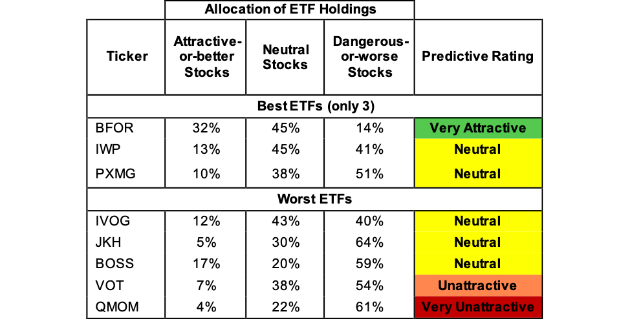[ad_1]
The Mid Cap Growth style ranks eleventh out of the twelve fund styles as detailed in our Q2’19 Style Ratings for ETFs and Mutual Funds report. Last quarter, the Mid Cap Growth style ranked eleventh as well. It gets our Unattractive rating, which is based on an aggregation of ratings of 10 ETFs and 355 mutual funds in the Mid Cap Growth style. See a recap of our Q1’19 Style Ratings here.
Figure 1 ranks from best to worst the eight Mid Cap Growth ETFs that meet our liquidity standards and Figure 2 shows the five best and worst rated Mid Cap Growth mutual funds. Not all Mid Cap Growth style ETFs and mutual funds are created the same. The number of holdings varies widely (from 13 to 1727). This variation creates drastically different investment implications and, therefore, ratings.
Investors seeking exposure to the Mid Cap Growth style should buy one of the Attractive-or-better rated ETFs or mutual funds from Figures 1 and 2.
Our Robo-Analyst technology[1] empowers our unique ETF and mutual fund rating methodology, which leverages our rigorous analysis of each fund’s holdings.[2] We think advisors and investors focused on prudent investment decisions should include analysis of fund holdings in their research process for ETFs and mutual funds.
Figure 1: ETFs with the Best & Worst Ratings
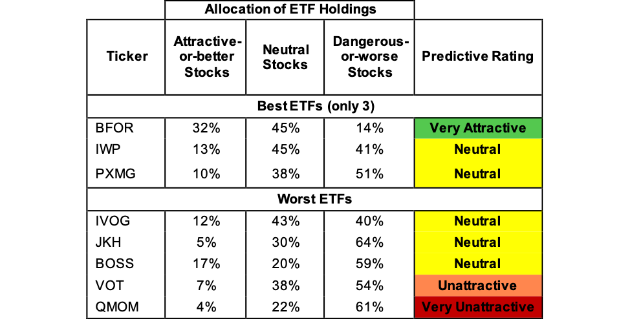 * Best ETFs exclude ETFs with TNA less than $100 million for inadequate liquidity.
* Best ETFs exclude ETFs with TNA less than $100 million for inadequate liquidity.
Sources: New Constructs, LLC and company filings
Franklin LibertyQ U.S. Mid Cap Equity ETF (FLQM) is excluded from Figure 1 because its total net assets (TNA) are below $100 million and do not meet our liquidity minimums.
Figure 2: Mutual Funds with the Best & Worst Ratings – Top 5
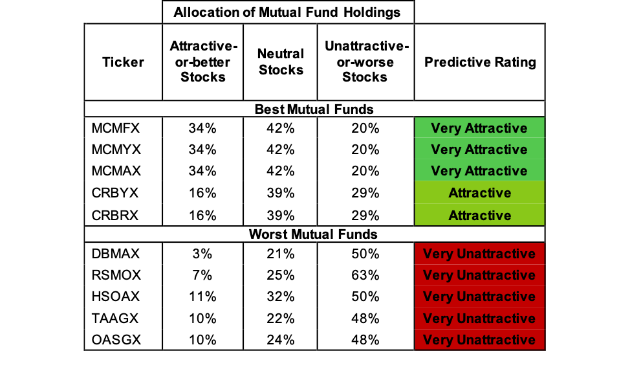 * Best mutual funds exclude funds with TNA less than $100 million for inadequate liquidity.
* Best mutual funds exclude funds with TNA less than $100 million for inadequate liquidity.
Sources: New Constructs, LLC and company filings
Barron’s 400 ETF (BFOR) is the top-rated Mid Cap Growth ETF and AMG Managers Cadence Mid Cap Fund (MCMFX) is the top-rated Mid Cap Growth mutual fund. Both earn a Very Attractive rating.
Alpha Architect U.S. Quantitative Momentum ETF (QMOM) is the worst rated Mid Cap Growth ETF and Optimum Small-Mid Cap Growth Fund (OASGX) is the worst rated Mid Cap Growth mutual fund. Both earn a Very Unattractive rating.
The Danger Within
Buying a fund without analyzing its holdings is like buying a stock without analyzing its business and finances. Put another way, research on fund holdings is necessary due diligence because a fund’s performance is only as good as its holdings’ performance. Don’t just take our word for it, see what Barron’s says on this matter.
PERFORMANCE OF HOLDINGs = PERFORMANCE OF FUND
Analyzing each holding within funds is no small task. Our Robo-Analyst technology enables us to perform this diligence with scale and provide the research needed to fulfill the fiduciary duty of care. More of the biggest names in the financial industry (see At BlackRock, Machines Are Rising Over Managers to Pick Stocks) are now embracing technology to leverage machines in the investment research process. Technology may be the only solution to the dual mandate for research: cut costs and fulfill the fiduciary duty of care. Investors, clients, advisors and analysts deserve the latest in technology to get the diligence required to make prudent investment decisions.
Figures 3 and 4 show the rating landscape of all Mid Cap Growth ETFs and mutual funds.
Figure 3: Separating the Best ETFs from the Worst Funds
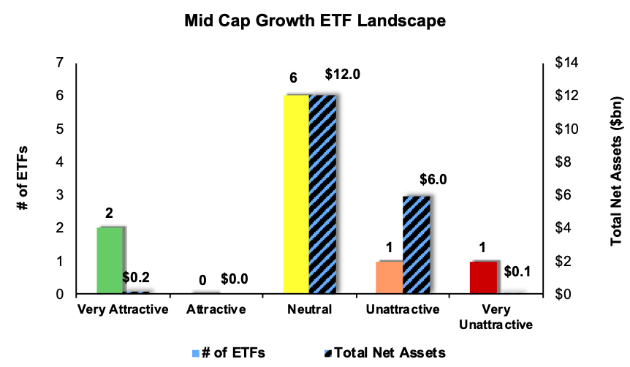 Sources: New Constructs, LLC and company filings
Sources: New Constructs, LLC and company filings
Figure 4: Separating the Best Mutual Funds from the Worst Funds
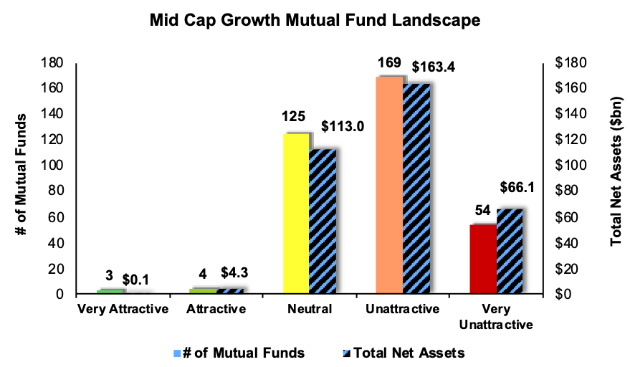 Sources: New Constructs, LLC and company filings
Sources: New Constructs, LLC and company filings
This article originally published on April 25, 2019.
Disclosure: David Trainer and Kyle Guske II receive no compensation to write about any specific stock, style, or theme.
[1]Harvard Business School features the powerful impact of our research automation technology in the case New Constructs: Disrupting Fundamental Analysis with Robo-Analysts.
[2]Ernst & Young’s recent white paper “Getting ROIC Right” proves the superiority of our holdings research and analytics.
Get our long and short/warning ideas. Access to top accounting and finance experts.
Deliverables:
1. Daily – long & short idea updates, forensic accounting insights, chat
2. Weekly – exclusive access to in-depth long & short ideas
3. Monthly – 40 large, 40 small cap ideas from the Most Attractive & Most Dangerous Stocks Model Portfolios
Both Ernst & Young and Harvard Business School demonstrate the superiority of our research in recent white papers.
See the difference that real diligence makes.
Disclosure: I/we have no positions in any stocks mentioned, and no plans to initiate any positions within the next 72 hours. I wrote this article myself, and it expresses my own opinions. I am not receiving compensation for it. I have no business relationship with any company whose stock is mentioned in this article.
[ad_2]
Source link Google News

